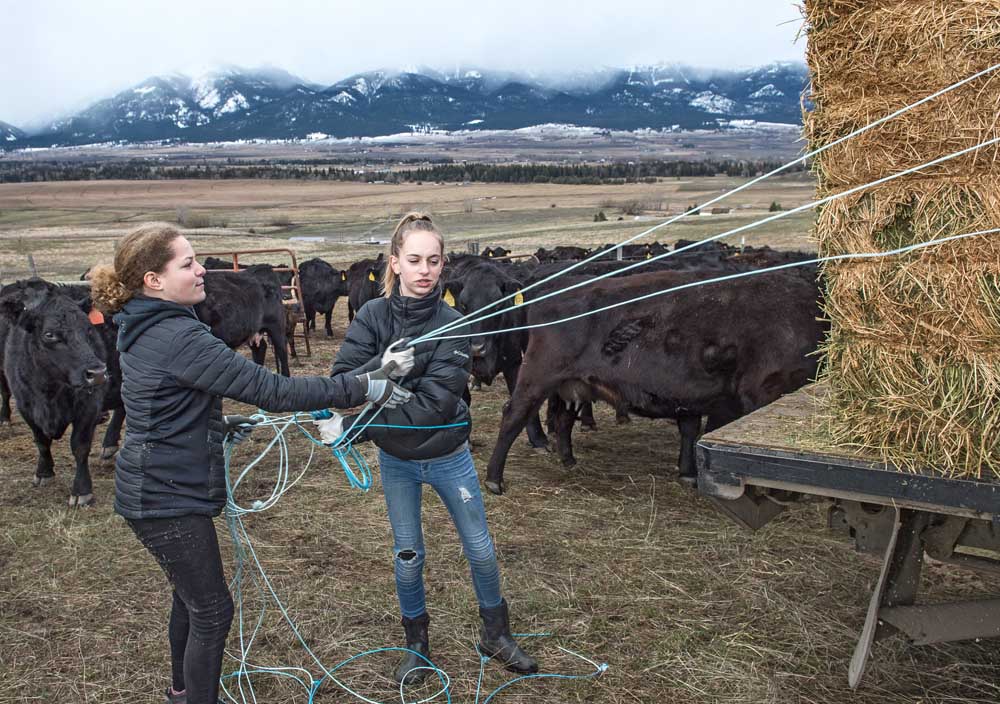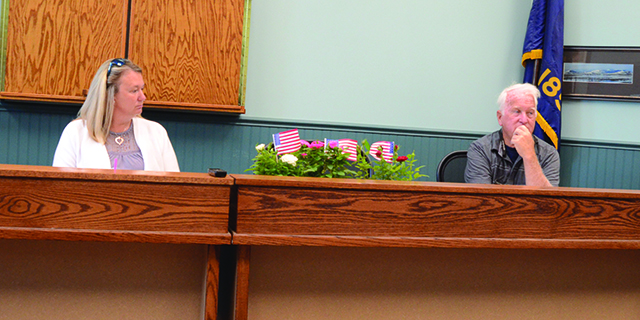Portland to Wallowa County: 4-H bridges the divide
Published 12:41 pm Wednesday, April 17, 2019

- Portland 4-H’ers Maya Braibish and Julia Larking remove string from a one-ton bale on preparation for feeding Todd Nash’s cows.
On a dark, drizzling April morning, cold even by Wallowa County standards, Todd Nash stops his truck amid a sea of hungry Angus cows and their calves. Clouds veil the mountains. There is more mud than grass. It’s bleak.
Nash slices blue twine from the one-ton bale perched on the back of his flatbed and Portland area middle school students Maya Braibish and Julia Larkin gamely clamber up onto back of truck to wrestle with an ungainly, lopsided one ton big bale. Cows anxious for food furtively steal hay. As Nash creeps the truck across the pasture, the two girls begin peeling off big flakes. “Breakfast is served,” Braibish shouted.
This is the 12th year that Wallowa County’s 4-H extension program has collaborated with Portland-area schools to help bridge the urban-rural divide. This year, a dozen middle-schoolers from the Portland-area spent April 5-9 living and working with four Wallowa County ranching families.
The program seems to be working. “It’s a real eye-opener for these kids to see what these small rural communities are like out here,” said Scott Lawrence, the Portland-area 4-H coordinator for the program. “All of them are surprised by what they learn. On our trip home, some of them talk about ranching and farming as careers when they grow up. Their understanding of ranchers and rural life can really change.”
Changes in perceptions of rural, ranching life can be both humorous and insightful.
“I didn’t really expect them to have a modern house because the videos showed them living in, like, log cabins,” said seventh grader Gigi Bareilles. “I didn’t think they’d necessarily have phones. But they were, like, listening to modern music and everything. I was kinda surprised.”
Working up-close and personal with livestock was a new, and sometimes amazing thing. Many of the Portland 4-H’ers had animals — but mostly dogs, cats, and bunnies. “I’ve never been that close to animals that big — cows and horses. It was kind of a shock,” Bareilles said. Larkin and Braibish took a turn at gathering and pushing Todd Nash’s errant calves back into the correct pasture. “It’s fun and you have to think,” Braibush said. “You have to be smarter than the calf. Sometimes that’s not easy.”
Other students brushed, rode, and communed with horses. “There’s a lot of hair out here,” said Hadley Kersens, holding up a fluffy-looking currycomb. She and Rita Tran helped out on the Ketscher ranch, with duties that included vaccinating calves and tending to fences and water troughs, as well as learning a few pointers on horse-care.
Some tried new foods that were never on the menu at home. Eighth grader Jason Co, who stayed with the Wentz family, sampled biscuits and gravy, chili lasagna, and cinnamon rolls for the first time — foods that his traditional, first generation Asian family never ate. His favorite? “Pot roast,” he said.
The work ethics and friendliness of their host families made lasting impressions on the Portland 4-H’ers. “The people we stayed with (the Royce family) were really nice and welcoming. They gave out a really positive energy. They were a fun family to stay with,” said seventh grader Bella Pylant. “And they all worked really hard.”
“The reason why I did the 4-H thing is to learn more about other people,” Co said. “We hear a lot about the urban-rural divide. I wanted to see the differences. But it’s not so much a divide, it’s just a different lifestyle.”
“This program was initially based in natural resources issues,” said Debi Warnock, Wallowa County’s 4-H extension agent. “But it’s become broader than that. It’s more about the fact that people are basically the same no matter where they live.”
Wallowa County students in grades six through nine will have a chance to participate in the exchange by living with a Portland 4-H family next year. For more information, contact Warnock at 541-426-3143.









